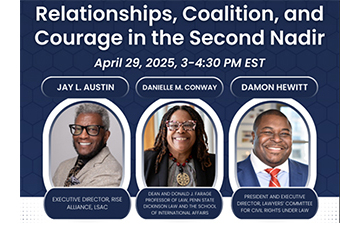ADI HOSTS IMPACTFUL AND UPLIFTING ‘RELATIONSHIPS, COALITION, AND COURAGE IN THE SECOND NADIR’ WEBINAR
May 2025 — The Antiracist Development Institute (ADI) at Penn State Dickinson Law recently sponsored an informative, thought-provoking, and ultimately hopeful webinar titled “Relationships, Coalition, and Courage in the Second Nadir.”
 The virtual event, which took place on April 29 and was open to all, featured three nationally recognized leaders in racial and social justice, including Penn State Dickinson Law Dean and Donald J. Farage Professor of Law Danielle M. Conway, the executive director of the ADI. She was joined by Damon Hewitt, the president and executive director of the Lawyers' Committee for Civil Rights, and Jay Austin, executive director of the Law School Admission Council's Reaffirming Individuals Supporting Education (RISE) Alliance.
The virtual event, which took place on April 29 and was open to all, featured three nationally recognized leaders in racial and social justice, including Penn State Dickinson Law Dean and Donald J. Farage Professor of Law Danielle M. Conway, the executive director of the ADI. She was joined by Damon Hewitt, the president and executive director of the Lawyers' Committee for Civil Rights, and Jay Austin, executive director of the Law School Admission Council's Reaffirming Individuals Supporting Education (RISE) Alliance.
During their wide-ranging discussion, the trio shared personal stories of resilience and underscored the need for authentic allyship and iterative learning in coalition efforts. Conway also touched on the many relationships the ADI has formed since its founding nearly four years ago.
Defining the Second Nadir
ADI Program Manager TaWanda Hunter Stallworth opened the webinar by explaining the origin of the “second nadir” referenced in the webinar title. “In 1954, historian Rayford Logan coined the phrase ‘the nadir’ to refer to the lowest point of race relations in United States history, from the end of Reconstruction until well into the 20th century,” said Stallworth.
That time was defined by shameful public responses to the Reconstruction Amendments and Jim Crow, Stallworth explained. “Good church people would leave houses of worship and attend lynchings in their community to watch for spectacle and to collect souvenirs for generations to come. May we never forget the nadir,” said Stallworth.
Seven years ago, N.D.B. Connolly penned an article suggesting the nation had entered a second nadir, a notion that spoke to Stallworth. “Knowing where you are not only defines the experiences you have, but it also helps you to understand how you will get to where you want to go,” said Stallworth. “You will never get to your destination if you are unclear about your present location.”
‘I can't tell you how excited I am to be here’
Before the discussion began, virtual participants were invited to share a single word describing how they felt that day. “Fearful,” “concerned,” “worried,” and similar words popped into the chat. It underscored the urge many, including the speakers, had to connect. “I can't tell you how excited I am to be here facilitating what's going to be a really amazing, important conversation,” Austin said.
The discussion examined the current state of racial and social justice in the United States, highlighting the erosion of federal protections for certain groups and attacks on higher education.
Conway noted that Black people in America, “even though we've been teachers in this movement, can also be learners.” She said that the current political climate has created an opportunity for leaders to use their voices and build coalition, then shared her thoughts on the most effective ways to do this. “Teaching and learning must go on within a collective. It cannot just be, ‘Here is our mission, here is our issue, let us attack it, and then we are finished.’ There must be teaching and learning of an iterative nature within those coalition partnerships,” said Conway.
Hewitt urged people working in coalition to show each other grace and remember that the work is relational. “It enriches us all to be iterative in that way, to continue to grow, continue to learn,” said Hewitt. “That voice opportunity, that power is what we certainly fight for and push for today, and we know that one organization and one group can't do that alone. So, everything we do is in coalition.”
Austin shared a quote from Vernon E. Jordan, Jr., Esq. Endowed Chair in Civil Rights at Howard University School of Law, Sherrilyn Ifill, the former president and director-counsel of the NAACP Legal Defense Fund and keynote speaker at the ADI’s inaugural convening in 2023.
“As Sherrilyn Ifill said, it is our job to plant so there will be another harvest in the future for others to enjoy,” said Austin. “Because if we do not plant now, if we do not take the time to plant now, there will be no future harvests for any of us to enjoy, particularly as Black Americans.”
After the conversation wrapped up, participants were again invited to share a single word describing their states of mind. This time, optimism ruled, in deep contrast to the mood at the start of the session. Words like “hopeful,” “energized,” and “inspired” filled the chat room, and participants left excited to engage with the work ahead.
You can watch the webinar by clicking here.